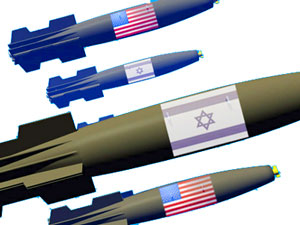By Ron Walters
-Guest Columnist-

The myth is that the U.S. is the most powerful nation in the world, and that Israelis are some of the smartest people in the world. Well, why are they both bogged down in the Middle East, utilizing military approaches to problems that, in the end, will not yield to successful solutions?
Surely, Israel must have watched the U.S. slide slowly into the morass of Iraq, being sucked into a guerilla war that they appeared too arrogant to acknowledge as a dangerous form of confrontation. They must have seen the most powerful military machine in the world expose itself as prime targets for guerilla fighters, disappearing into the backdrop of society in both open daylight and by dint of night.
Most of all, they must have seen that there is an even deeper quagmire, with Iranian-sponsored elements stoking a civil war that threatens any hope of a stable government in Iraq. In that context, why boil the pot higher, hotter?
Israel needs security in the region. Yet, it is caught up in the same illusion that military might can provide them with the protection that they need to secure the lives of the Israeli people. They apparently believe that a policy of genuine rapprochement based on stronger political, economic regional integration is a sign of weakness and that a reasonable and balanced expression of military power cannot be tolerated.
In other words, they appear to want the legitimacy of their existence to be based on the fear of their neighbors. In that case, the strategy is to resort to displays of power, even for minor threats, that do not result in the intended solution, but in the intensification of the hatred that fomented actions against them in the first place.
Hezbollah has won this encounter by fighting a superior military force without being driven into submission. There was this picture of a young Hezbollah fighter crawling out of a building that had been severely bombed by Israeli planes, saying, “We are still here.” He was expressing the obvious: That just as Israelis were united by the Nazi oppression to fight harder for their own self-determination, their devastating attack on Lebanon–while damaging to the physical infrastructure of the country–raised the spirit of the resistance in the mere survival of their opponents.
Now, Hezbollah stands as a heroic force to the Lebanese people, entrenching their power not only in the country, but in the eyes of Iran and Syria as well. The captured Israeli soldiers were not taken from Hezbollah, and it is unlikely that the security zone that stretches from Israel’s border to the Litani River will provide the strategic security they sought for the northern cities.
So, what was it all for?
What we know is that the mood is palpably different in war-torn Lebanon, as people stream back to destruction, but claim victory and wave Hezbollah flags; while in Israel, there is confusion, bitterness and soul-searching. The not-so-subtle criticism of the government in Israel by its own people has caused Prime Minster Ehud Olmert to accept full responsibility for the military campaign and its consequences, potentially destabilizing his regime.
In the midst of it all, President George Bush announces that Israel won the military encounter, as if to provide positive support to salve an uncertain question hanging in the atmosphere. It was not the first time he declared a victory when none was in sight.
Not only was there no question that Israel would win the military encounter, this fact poses the question of what else did it hope to win in the process. In his actions, Pres. Bush also illustrates his lack of diplomatic sagacity–his bold, one-sided stance continues to tarnish the prospect of the United States being an honest broker in the region. How, then, is it possible for Arab countries to return to the so-called Road Map with any assurance that the U.S. could be fair, in the poisonous atmosphere where all of them denounced the Israeli invasion of Lebanon.
Moreover, the future of the peace path in the Middle East and the position of the U.S. are further complicated by being placed in the position to provide unlimited legitimacy and support for actions that it did not foresee, with an open political checkbook and an economic one that now must restock its allies military supplies.
At the end, when it was clear that Israel could not achieve its stated objectives–before the world–it settled for a United Nations-negotiated peace plan as a practical way out of the debacle. This would appear to be a lesson for the United States, as well. But then, just as Israel has not learned from the United States’ difficulties, the personality of the president may not allow this practical lesson to guide its policy.
(Ron Walters is the director of the African American Leadership Institute and professor of Government and Politics at the University of Maryland College Park.)
Graphic: Harold Muhammad/MGN Online












